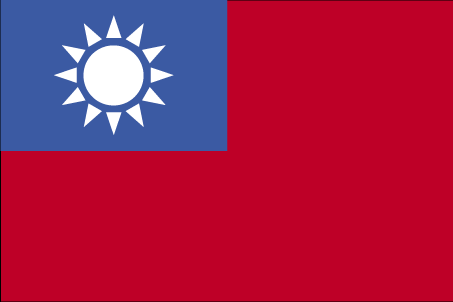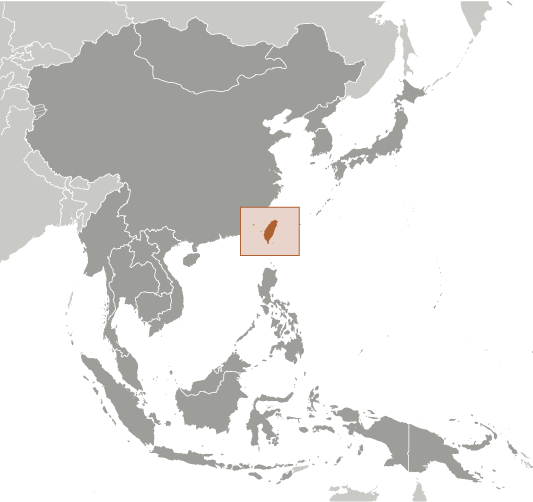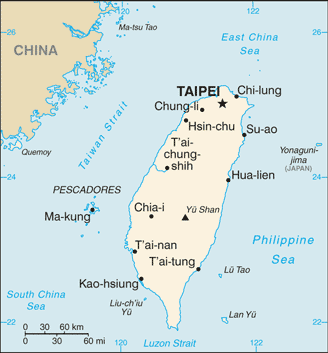In 1895, military defeat forced China to cede Taiwan to Japan. Taiwan reverted to Chinese control after World War II. Following the Communist victory on the mainland in 1949, 2 million Nationalists fled to Taiwan and established a government using the 1947 constitution drawn up for all of China. Over the next five decades, the ruling authorities gradually democratized and incorporated the local population within the governing structure. In 2000, Taiwan underwent its first peaceful transfer of power from the Nationalist to the Democratic Progressive Party. Throughout this period, the island prospered and became one of East Asia's economic "Tigers." The dominant political issues continue to be the relationship between Taiwan and China - specifically the question of Taiwan's eventual status - as well as domestic political and economic reform.
Country Name
Conventional long form:none
Conventional short form:Taiwan
Local long form:none
Local short form:T'ai-wan
Former:Formosa
Government Type
multiparty democracy
Capital
Name:Taipei
Geographic coordinates:25 03 N, 121 30 E
Time difference:UTC+8 (13 hours ahead of Washington, DC during Standard Time)
Administrative divisions
includes main island of Taiwan plus smaller islands nearby and off coast of China's Fujian Province; Taiwan is divided into 18 counties (hsien, singular and plural), 5 municipalities (shih, singular and plural), and 2 special municipalities (chih-hsia-shih, singular and plural)
note: Taiwan uses a variety of romanization systems; while a modified Wade-Giles system still dominates, the city of Taipei has adopted a Pinyin romanization for street and place names within its boundaries; other local authorities use different romanization systems; names for administrative divisions that follow are taken from the Taiwan Yearbook 2007 published by the Government Information Office in Taipei.
counties: Changhua, Chiayi [county], Hsinchu [county], Hualien, Kaohsiung [county], Kinmen, Lienchiang, Miaoli, Nantou, Penghu, Pingtung, Taichung [county], Tainan [county], Taipei [county], Taitung, Taoyuan, Yilan, and Yunlin
municipalities: Chiayi [city], Hsinchu [city], Keelung, Taichung [city], Tainan [city]
special municipalities: Kaohsiung [city], Taipei [city]
National Holiday
Republic Day (Anniversary of the Chinese Revolution), 10 October (1911)
Constitution
adopted on 25 December 1946; promulgated on 1 January 1947; effective 25 December 1947; amended numerous times
Legal system
based on civil law system; has not accepted compulsory ICJ jurisdiction
Suffrage
20 years of age; universal
Executive branch
Chief of state: President MA Ying-jeou (since 20 May 2008); Vice President Vincent SIEW (since 20 May 2008)
Head of government:Premier (President of the Executive Yuan) WU Den-yih (since 10 September 2009); Vice Premier (Vice President of Executive Yuan) Sean CHEN (since 17 May 2010)
Cabinet:Executive Yuan - (ministers appointed by president on recommendation of premier)
(For more information visit the World Leaders website)
Elections:president and vice president elected on the same ticket by popular vote for four-year terms (eligible for a second term); election last held on 22 March 2008 (next to be held in March 2012); premier appointed by the president; vice premiers appointed by the president on the recommendation of the premier
Election results:MA Ying-jeou elected president; percent of vote - MA Ying-jeou 58.45%, Frank HSIEH 41.55%
Legislative branch
unicameral Legislative Yuan (113 seats - 73 district members elected by popular vote, 34 at-large members elected on basis of proportion of islandwide votes received by participating political parties, 6 elected by popular vote among aboriginal populations; members to serve four-year terms); parties must receive 5% of vote to qualify for at-large seats
Elections:Legislative Yuan - last held on 12 January 2008 (next to be held in December 2011 or January 2012)
Election results:Legislative Yuan - percent of vote by party - KMT 53.5%, DPP 38.2%, NPSU 2.4%, PFP 0.3%, others 1.6%, independents 4%; seats by party - KMT 81, DPP 27, NPSU 3, PFP 1, independent 1; note - seats by party as of April 2010 - KMT 74, DPP 33, NPSU 1, PFP 1, independent 2
Judicial branch
Judicial Yuan (justices appointed by the president with consent of the Legislative Yuan)
Political Parties and Leaders
Democratic Progressive Party or DPP [TSAI Ing-wen]; Kuomintang or KMT (Nationalist Party) [MA Ying-jeou]; Non-Partisan Solidarity Union or NPSU [LIN Pin-kuan]; People First Party or PFP [James SOONG]
Political pressure groups and leaders
environmental groups; independence movement; various business groups
note: debate on Taiwan independence has become acceptable within the mainstream of domestic politics on Taiwan; political liberalization and the increased representation of opposition parties in Taiwan's legislature have opened public debate on the island's national identity; a broad public consensus has developed that the government enjoys popular sovereignty and - whatever the ultimate outcome regarding unification or independence - that Taiwan's people must have the deciding voice; public opinion polls consistently show a substantial majority of Taiwan people supports maintaining Taiwan's status quo for the foreseeable future; advocates of Taiwan independence oppose the stand that the island will eventually unify with mainland China; goals of the Taiwan independence movement include establishing a sovereign nation on Taiwan and entering the UN; advocates of eventual unification predicate their goal on the democratic transformation of the mainland
International organization participation
ADB, APEC, BCIE, ICC, IOC, ITUC, WFTU, WTO
Diplomatic representation in the US
none; commercial and cultural relations with the people in the United States are maintained through an unofficial instrumentality, the Taipei Economic and Cultural Representative Office in the United States (TECRO), a private nonprofit corporation that performs citizen and consular services similar to those at diplomatic posts
representative: Jason C. YUAN
office: 4201 Wisconsin Avenue NW, Washington, DC 20016
telephone: [1] 202 895-1800
Taipei Economic and Cultural Offices (branch offices): Atlanta, Boston, Chicago, Guam, Houston, Honolulu, Kansas City, Los Angeles, Miami, New York, San Francisco, Seattle
Diplomatic representation from the US
none; commercial and cultural relations with the people on Taiwan are maintained through an unofficial instrumentality, the American Institute in Taiwan (AIT), a private nonprofit corporation that performs citizen and consular services similar to those at diplomatic posts
director: William A. STANTON
office: #7 Lane 134, Hsin Yi Road, Section 3, Taipei, Taiwan
telephone: [1] [886] (02) 2162-2000
FAX: [1] [886] (07) 238-7744
other offices: Kaohsiung
Flag description
red field with a dark blue rectangle in the upper hoist-side corner bearing a white sun with 12 triangular rays










